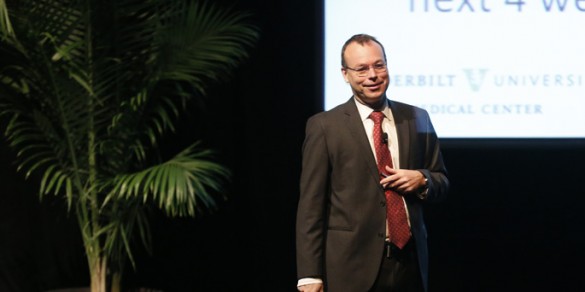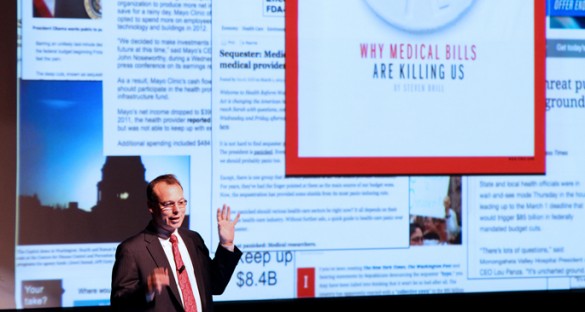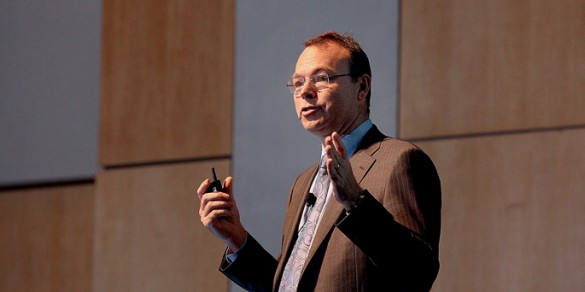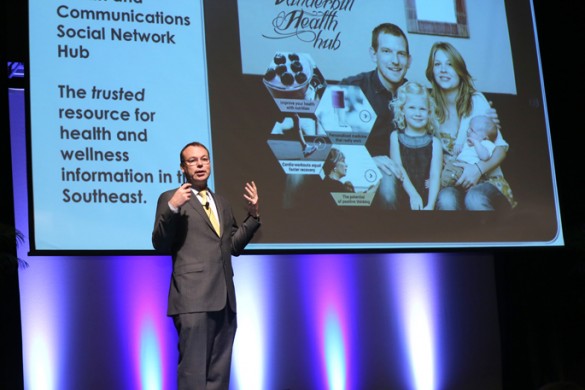
Engage.
This was the challenge and the promise extended to those in attendance during Tuesday’s winter Clinical Enterprise Leadership Assembly at Vanderbilt University Medical Center.
In his update, Jeff Balser, M.D., Ph.D., vice chancellor for Health Affairs and dean of Vanderbilt University School of Medicine, outlined a vision for Vanderbilt’s future that relies on building connections and trust with future generations of patients.
Connections — because patients and consumers increasingly want to be engaged with their health care providers. Trust — because “that’s what people are looking for,” Balser said. “We know we’re trusted. We’re trusted because of our quality. And our quality is the core of this vision.”
In his pillar update, C. Wright Pinson, MBA, M.D., deputy vice chancellor for Health Affairs and CEO of the Vanderbilt Health System, stressed that VUMC’s hospitals and clinics are on strong financial footing, which will help meet mission goals, while efforts focused on staff and nursing recruitment and retention are showing progress.
As an example he showed a group photo of 172 new nurse residents starting at VUMC this week. Pinson also acknowledged the Medical Center’s longstanding commitment to patient safety and quality with two recent initiatives.
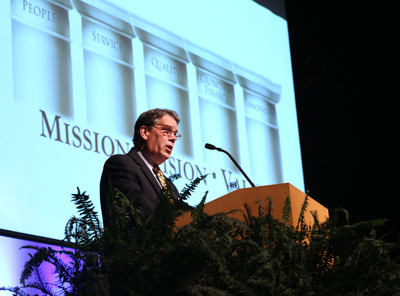
First, he called to the podium Ruth Schimmel, chief of staff for Quality, Safety and Risk Prevention, and Jannis Muscato, Human Resources director for Medical Service Delivery Teams, to describe their efforts to increase the percentage of Vanderbilt employees who got their flu shots this year.
As of Jan. 31, 91 percent of the Medical Center workforce was vaccinated, an increase of more than 5,000 people compared to last year, they reported.
Pinson also called on Timothy Geiger, M.D., assistant professor of Surgery, to describe his team’s effort to reduce the incidence of surgical site infections among patients undergoing colorectal surgery.
By carefully reviewing the data and reducing variations in surgical practice and post-operative care, the team has been able to reduce the incidence of surgical site infections by a full 50 percent, Geiger reported.
Why are these efforts important? “For me, it’s about the patient,” Pinson said. “And it’s about making this yet a better place to work.”
As for connections, Balser pointed out that Nashville’s population is expected to double within the next 20 years to more than a million people, and that one of the fastest-growing demographics is Millennials, those born between the years 1980 and 2000.
These are Vanderbilt’s future consumers and future patients, and they have a different way of interacting with the world, a way that is heavily reliant on social media, he said. Vanderbilt must meet them where they live.
As an example, Balser showed a video prepared by Medical Center Strategic Marketing and Communications that described what could eventually be called the “Vanderbilt Health Experience,” a social media hub, a place people can go to be connected to community and to VUMC.
Balser thanked the many employees who went beyond the call of duty during last week’s snow and ice storms, some working 48 hours straight, to ensure their patients were given the best possible care. That commitment “is really what defines this place,” he said.
Balser also gave an update on the Vanderbilt Health Affiliated Network (VHAN).
“Hundreds of hospitals are in discussions with Vanderbilt” about possibly affiliating, he said.
After a break, those attending were treated to a performance by the Vanderbilt Melodores, an a cappella group of nine undergraduate men who won NBC’s “Sing-Off” competition in December.
Afterward, Meg Rush, M.D., professor of Clinical Pediatrics and chief of staff for Monroe Carell Jr. Children’s Hospital at Vanderbilt, introduced the guest speaker, Scott Schwertly, founder and CEO of Ethos3, a Nashville-based presentation design and training firm.
Schwertly discussed how leaders can engage others through their presentations by first engaging and focusing on themselves, by keeping their presentations simple and by telling a story, rather than simply reciting facts, to increase the chances that what they say will be remembered.
“Engagement,” said Rush, “is the core of our success.”













